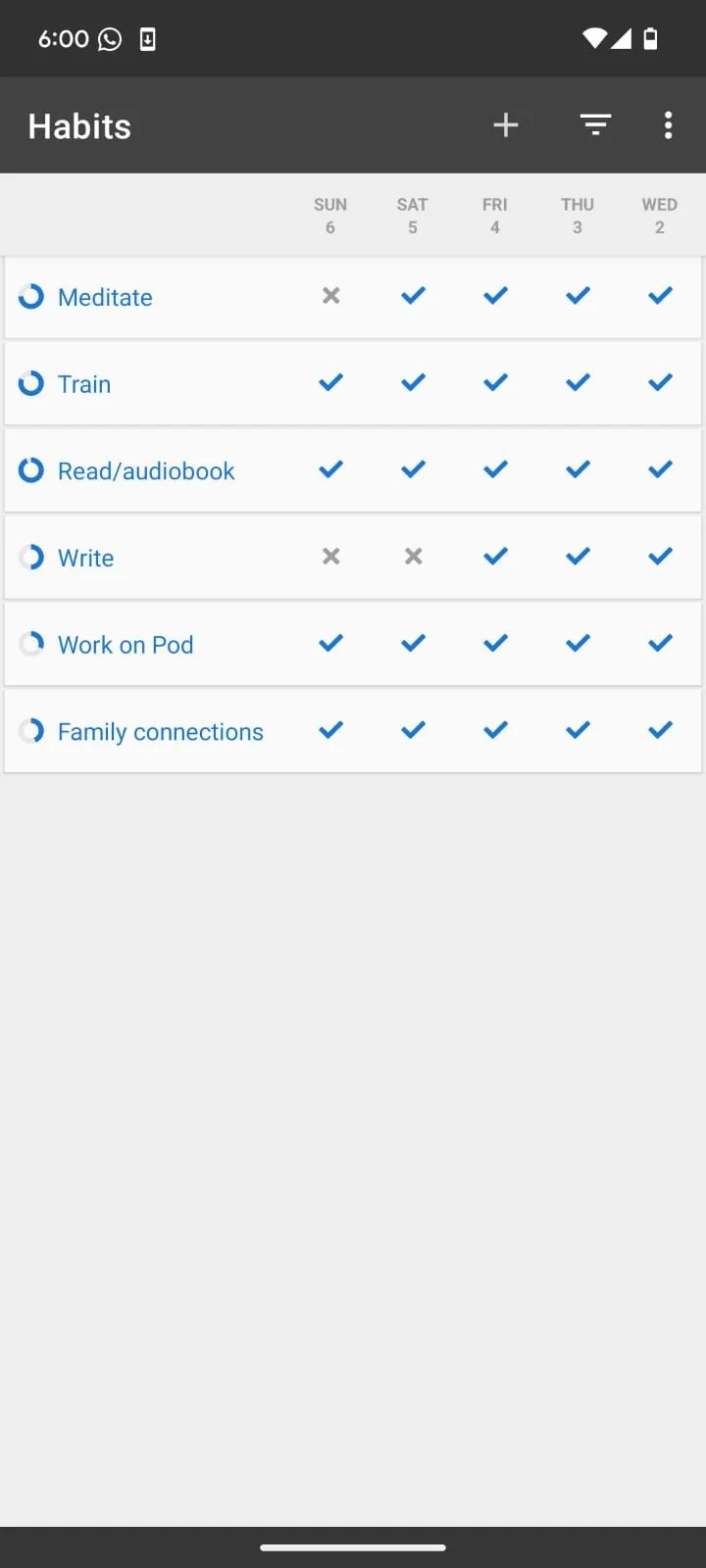The Habit Tracker Blueprint: Stop Starting Over
The Habit Tracker
Ever wondered why your habits never stick, no matter how hard you try? This is how I finally cracked the code and made change feel easy.
“The habit tracker is sacred.”
That’s a phrase I’ve repeated to myself time and time again. It is the most reliable source of change and wellness in my life. It is the simple scorecard that keeps me accountable to the promises I make to myself. Consistency beats a short-term heroic effort every time.
Why I Needed the Habit Tracker
Over the last few years, I have finally achieved a stable body composition after years of trying. Before, I would catch a glimpse of myself in the mirror on occasion, mortified by the pear-shaped figure where my 16-year-old six-pack once was. I would make a grand announcement: “This is it, I’m getting my former abs back.”
Then I would follow it up with eating one meal a day, or counting 1,400 calories, or quitting carbs, or swapping out meals for Aussielent (the Australian version of Soylent, the “meal in a bottle”).
I would go all in for a couple of days, maybe even a week, lose a few kilos (probably half muscle because of the deficit), then feel so exhausted and miserable I would get a pizza to cheer myself up. From there, I would be completely off the rails, gaining everything back and more over the following weeks, with a refeeding like you would not believe. Then came the stench of failure and disappointment in my lack of discipline.
The Game-Changer
So how did I conquer this part of my life?
The funny thing is, the solution was so much easier than the brutal starvation and restriction I had put myself through. I simply added “count calories” to my daily habit tracker. Not “under 2,000 calories per day”, not “one meal per day”, just counting.
That alone solved everything. It gave me a sense of awareness around what I was eating, what had more calories, what had less, what made sense in terms of calories versus satiation. Just tracking what went in made me far more intentional. Plus, you feel pretty terrible scanning your third Kit Kat into MyFitnessPal.
Things progressively got better, and I am the fittest and leanest I have been in years. This approach outlasted any fad diet or extreme cut I had ever tried. Tracking this one thing was the biggest driver for changing my body composition, and it was easy. It was not daunting or restrictive. All I had to do was record, simple.
After six months, I dropped calorie counting from the tracker altogether, because I could intuitively gauge what I should and should not be eating. That freed me up to ask: what is the next easy, trackable thing I can leverage through consistency to create massive change without blowing up my lifestyle? These days there is even software that can work out calories from photos. How easy is that?
“Habits” app
What Is a Habit Tracker?
A habit tracker is a simple scorecard you fill in every day, no matter what. It is sacred, remember. You list all your habits down the left, the days across the top, and mark a cross or a tick if you achieved the habit that day.
In Atomic Habits, James Clear emphasises removing friction to build good habits and break bad ones. Making desired actions easier, and undesired actions harder, makes success far more likely.
With that in mind, the easier you can make your habit-tracking process, the better.
I use a simple app called “Habits” on my phone, and it works best for me. I have seen people do all sorts of setups, but if it is a spreadsheet on my laptop, just the hassle of getting my laptop out will stop me from doing it. The phone is the simplest solution because it is basically an extension of us. It is on us all the time, and we are dying to pull it out anyway. So put the tracker there. You will be staring at your phone at all hours (unless you build a habit of putting it away).
I also don’t like the old-school notepad. If it is out on the bedside table, it looks messy. If it’s in a drawer, it’s out of sight, out of mind. That might not sound like friction, but it is, and it will kill your odds of success.
Also think about travel. Who wants to carry an extra book or open their laptop in Bali with kids running around? Not me. The habit tracker comes on holiday too. A holiday is not the time to ignore it. Commit all the sins you want on holiday except the one of ignoring your habit tracker. This is a way of life, not a “when I feel like it” thing.
Focus Beats Overload
Another key point is focus. I suggest tracking between three and seven habits, mixing fundamentals with behaviour change habits (more on that shortly).
Behaviour change happens in small increments. Trying to track ten or fifteen habits at once spreads your focus and willpower too thin.
If you have more than eight habits on your tracker, make sure no more than three of them are brand new, and the others are semi-established.
Keep It Manageable
Habits will evolve over time. For example, once I got my head around calorie tracking, I dropped it so I could focus on something else. Another habit I tracked was “don’t drink today”. Once I was sober for six months and identified as a non-drinker, I dropped that too, because it was solid and wasting a precious line on my tracker.
Keep habits simple. If you have never run before, do not put “run 5k every day” on your tracker. You will fail. Instead, put “get a run in” and define what counts. If you have run for five days in a row, you might count putting on your shoes and jogging 500 metres as a win. That is better than breaking the habit.
If your habit is going to the gym, it might be as simple as stepping foot on the gym floor. One of my fundamentals is “train”, which I define as running, lifting weights, cycling, or swimming. When I am travelling or cannot be bothered, that might look like 50 push-ups. Still a win.
Another example is writing. I do not put “write 1,000 words a day”. Just “write” is enough. The habit tracker is not where you get hyper-specific. The words, the reps, the results, they will come in time.
The habit tracker is about the long game, showing up every day. That is the true key to success.
Fundamentals and Behaviour Change
There are two main types of habits.
Fundamentals: These are your mood habits, the things you need to feel good. For me, it is train and meditate. Other examples might include a sleep score, alcohol moderation, gratitude practice, daily walks, or hugging your wife or kids.
If you feel anxious, angry, or down, you will usually see a bunch of X’s on your fundamentals. A friend of mine uses a spreadsheet that turns the cells green if he hits the habit and red if he misses. When he sees a sea of red, it is obvious why his mood is off.
Behaviour change: These are the small steps that move you towards your goals. Examples include 2400 calories, read, set daily priorities, work on a business plan, connect with each family member, or write.
These build momentum. If your goal is to start a business, behaviour-change habits might be “work on the business plan”, “read a business book”, or “talk to one business owner today”.
Why You Cannot Rely on Willpower Alone
There is plenty of research suggesting that willpower is a limited resource, but honestly, you do not need a study to know that.
When are you most likely to blow your diet? At night. Because you have used up your willpower all day dealing with other people’s demands.
That is why I do most of my habits in the morning, before the world drains my energy. That is also why the habit tracker is so important, because it systemises the change, so you do not have to rely on raw willpower.
Without systems, standards naturally drop.
Building in Accountability
Accountability is the best way to get anything done, but it is also the hardest part of a habit tracker. No one else really cares if you change or not. Most people would rather keep you comfortable than hold you to account.
It feels easier to let someone off the hook, to give them a break, to be nice. Most people have the same “I will fix this later” mindset you did before you started tracking, so why would they hold you to a higher standard?
People only hold others accountable when the stakes are high: business, marriage, legal issues, rehab. Losing ten kilos or writing a book does not feel urgent enough. But that’s an illusion.
You have one life. You are wasting it if you are not doing what you want, being who you want, feeling how you want. What stakes could be higher?
Habits don’t stop in Bali!
If you can find the right person to do this with, it is gold. Look for someone else dedicated to changing their life, who wants more, and who understands why this matters.
Set some rules up front. For example:
· Send each other a screenshot of your tracker before 8 p.m. on Sundays
· If the tracker is full of X’s, the other person asks, “Is everything OK? Do you need help getting back on track?”
· If no screenshot arrives, a simple prompt: “Hey, can you please send your habit tracker through? Need any support?”
Simple.
At the end of the day, you are the driver of this change. If your motivation depends entirely on someone else, you’re hostage to their commitment instead of your own. This is why “the habit tracker is sacred” is so important for me to remember.
That said, if you find the right person, it can work brilliantly.
When Things Get Tough
I am going through some tough stuff in my own life while writing this. What I try to remember is that I deserve to reach the destination these habits will take me to.
This is not a chore. It is a blessing, a leg up, a north star. It is an act of self-love, and if you abandon it, you are robbing yourself of what you could be. You will end up letting life drag you along instead of going where you truly want to thrive.
Now go forth, implement, and feel the ever-so-slight but extremely powerful incremental change.
Luke Biermann, Curious AF



